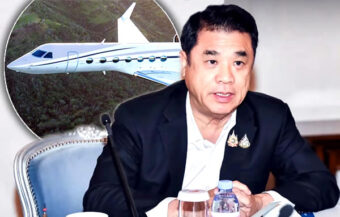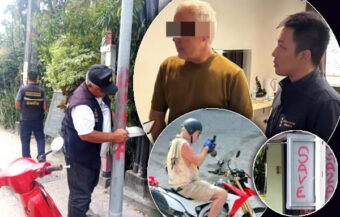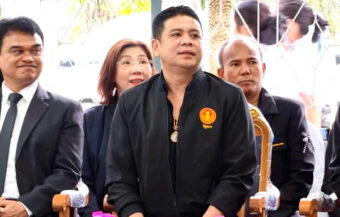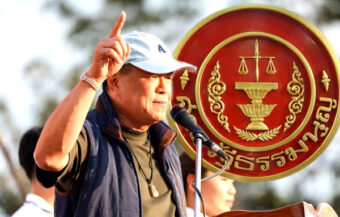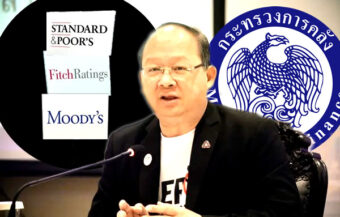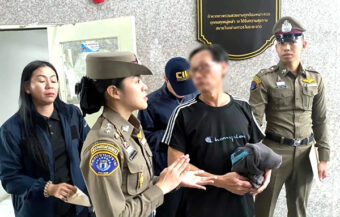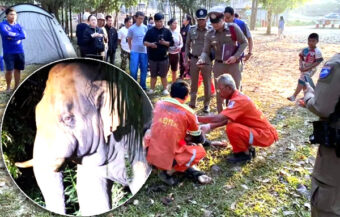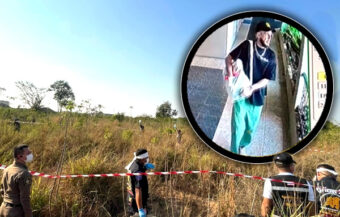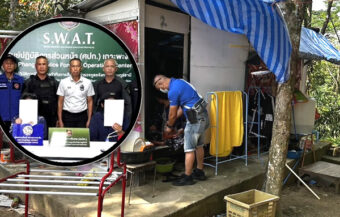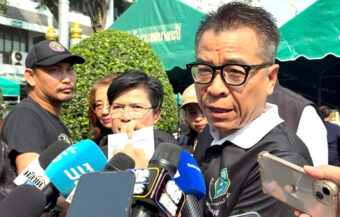Thaksin urges steep excise taxes on Chinese-assembled EVs in Thailand to protect local industry. The government plans new tax rules rewarding genuine Thai-made parts, aiming to boost domestic manufacturing and fend off foreign domination of the EV market.
Former Prime Minister Thaksin Shinawatra is demanding the government crack down on cheap EV assembly in Thailand — mainly by Chinese firms. He warns that without pushing full-scale EV manufacturing at home, Japan’s car giants, the industry’s backbone, will be disadvantaged. The stakes are high: Thailand risks losing its hard-earned position in the global market. After sealing a trade deal with the U.S. demanding genuine “Made in Thailand” exports, the government can’t afford to drag its feet. Deputy Finance Minister Paopoom Rojanasakul has already greenlit plans to slap excise duties on low-local-content EVs. The message is clear: source local.
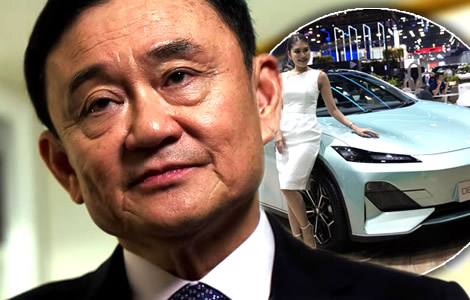
Former Prime Minister Thaksin Shinawatra is urging bold action to protect Thailand’s domestic car industry. He wants the government to impose a steep excise tax on imported electric vehicles (EVs) that contain little to no locally made content.
Thaksin voiced his concern during a recent automotive conference. He warned that free trade agreements (FTAs) — especially the ASEAN-China deal — have allowed a flood of zero-tariff EV imports. These vehicles, mostly from China, now dominate the Thai market, threatening the survival of domestic carmakers.
He argued that foreign EVs should meet a minimum threshold of local content, such as Thai-made car seats. Without such requirements, Thailand’s automotive ecosystem may weaken. Thaksin believes this approach would encourage more investment in local parts production.
Government considers excise tax overhaul to reward Thai-made parts and penalise fully imported EVs
In response to his remarks, the Excise Department is considering a major overhaul of the country’s vehicle tax system. The proposed plan would reward automakers that use domestically produced components with lower tax rates.
Meanwhile, fully imported vehicles — known as completely built-up units — would face much higher rates. Deputy Finance Minister Paopoom Rojanasakul confirmed the shift in strategy. “Our goal is to strengthen local supply chains,” he stated. “Incentivising the use of Thai-made parts supports jobs and investment.”
The EV car sector is enjoying a more successful year in 2025 after a fall-off in sales during 2024. In recent weeks, the government has also eased requirements for prominent Chinese manufacturers, allowing exported cars to be calculated in quotas to generate incentives for each car sold by Chinese firms in Thailand.
Notably, this change comes amid rising tensions over global trade. Some analysts suggest that Thailand may also be reacting to potential U.S. tariff threats on car exports. However, others argue the U.S. market plays a limited role in Thailand’s car industry.
American cars unlikely to gain ground in Thailand as regional automakers lead rapid EV growth
Economist Sompop Manarungsan pointed out that American cars are unlikely to gain ground in Thailand. “U.S. vehicles are more expensive and slower to update,” he said. “Even in Japan, their market share is tiny.” Therefore, lower tariffs on American cars are unlikely to shift consumer demand in Thailand.
He added that Southeast Asian automakers, including those in Thailand, are more agile. They frequently launch new models and offer competitive prices. As a result, they are better positioned to lead the regional EV transformation.
Indeed, Thailand has seen a surge in EV registrations. From 2022 to 2024, battery electric vehicles (BEVs), plug-in hybrids (PHEVs), and hybrids (HEVs) saw rapid growth. Registrations jumped from 84,500 units in 2022 to 206,000 in 2024.
Additionally, the Board of Investment (BoI) approved 644 projects tied to EV production and parts. These projects represent over ฿280 billion in total investment.
Thailand’s EV sales soar in 2025 with record registrations. Chinese brands face price wars and new rules
In the first half of 2025 alone, Thailand registered 57,289 new BEV passenger vehicles. That’s a 52% year-on-year increase. Currently, EVs make up more than 15% of new car sales in the country — the highest rate in Southeast Asia.
Moreover, Thailand now has over 203,000 registered BEV passenger cars. There are also 71,900 electric motorcycles, 3,800 electric buses and trucks and about 1,000 electric three-wheelers.
While these numbers are promising, the market has become highly competitive. Several Chinese EV brands that initially entered Thailand have already exited. Price wars, combined with unmet production quotas, forced them to return subsidies and pay penalties.
Under Thailand’s EV incentive schemes, foreign brands must produce a certain number of cars locally to qualify for tax breaks. These conditions are laid out in two programmes — EV3.0 and EV3.5.
EV3.0 requires a 1:1 production-to-import ratio for firms that began manufacturing in 2024. Those starting in 2025 must meet a 1.5:1 ratio. Meanwhile, EV3.5 raises the bar further — with ratios of 1:2 and 1:3 — to be met between 2024 and 2027.
National EV Policy eases production rules to boost exports and maintain momentum in Thailand’s EV sector
However, the National EV Policy Committee, also called the EV Board, recently eased these production rules. The adjustment was made to encourage exports and avoid oversaturation in the local market.
This shift aims to increase EV exports to 12,500 units this year and 52,000 by 2026. The Federation of Thai Industries endorsed the change, arguing it would maintain momentum in the country’s EV sector.
Thailand’s long-term vision is clear. It wants to transition from a global leader in internal combustion engine (ICE) vehicles to a hub for EV manufacturing. In 2023, Thailand ranked as the world’s 10th-largest producer of ICE cars.
To accelerate this shift, the Excise Department will soon introduce a new tax framework. After the current EV incentives expire in 2025, new tax rates will depend on the use of specific Thai-made components.
New phased excise tax rules will reward automakers using Thai-made EV parts in the finished car
If automakers use key local parts — such as batteries, inverters, or drive control units — they’ll qualify for a 2% excise tax rate. Otherwise, a much higher rate of 10% will apply.
These local content rules will roll out in phases. Starting in 2026, manufacturers must use Thai-made batteries, at least at the pack level. Notably, all EV makers with plants in Thailand already meet this requirement.
By 2030, automakers must also use Thai-produced inverters to enjoy tax breaks. However, if a company invests in battery cell production, it won’t be required to build an inverter factory.
By 2035, the bar will rise again. Companies must locally produce battery management systems and drive control units to qualify for lower tax rates.
Despite China’s ability to export EVs tariff-free under the ASEAN-China FTA, the Thai government is now considering additional tax controls. According to sources, the Board of Investment may introduce support measures specifically for imported EVs that meet Thai local content requirements.
Thailand’s EV sector climbs with billions poured into manufacturing, batteries, parts and charging
Investment in Thailand’s EV sector continues to climb. As of early 2025, EV-related projects had attracted a combined investment of over ฿138 billion. These projects span car manufacturing, battery plants, charging networks and parts production.
This includes 21 BEV car factory projects with a combined capacity of 386,000 units per year. There are also 16 electric motorcycle projects aiming to produce 810,000 bikes annually. Meanwhile, three bus and truck EV projects plan to produce 4,800 units yearly.
Battery manufacturing has also boomed. Fifty-three projects represent a total investment of 80.1 billion baht. In addition, 42 parts-related projects — covering motors, chargers, and control systems — have drawn 6.52 billion baht in investment.
EV infrastructure is expanding fast. Twenty-nine charging station projects aim to install 20,080 charging points nationwide. This includes 7,360 fast chargers.
Battery swapping is also growing. Five projects will install 555 swap stations for motorcycles, seven for trucks, and six for passenger EVs.
Thailand has over 3,700 public EV charging stations with thousands of fast and regular chargers
As of March 2025, Thailand had 3,720 public EV charging stations with 11,622 charging points. These include 6,524 fast (DC) chargers and 5,098 regular (AC) chargers.
The government has also amended tax rules for hybrid and plug-in hybrid vehicles. For hybrids emitting less than 100 grams of CO2 per km, the excise tax was lowered to 6% for seven years.
PHEV incentives were also revised. Previously, cars had to meet two strict conditions: an 80 km electric range and a fuel tank under 45 litres. Now, the fuel tank condition has been scrapped to better match real-world vehicle designs.
Chinese EV players in Thailand may opt out of subsidies as a difficult year ends. But there is optimism for electric cars
Sales of EV cars fell in Thailand in February and March 2024 challenging the kingdom’s vision as a green hub
Disturbing questions that must be confronted over Thailand’s reeling economy are China and EV cars
Ultimately, Thailand’s tax shift is about more than just numbers. It’s a strategic pivot toward long-term industrial resilience. By fostering local production, encouraging innovation, and managing imports, the country hopes to lead Southeast Asia’s EV revolution.
Join the Thai News forum, follow Thai Examiner on Facebook here
Receive all our stories as they come out on Telegram here
Follow Thai Examiner here
Further reading:
EV sector crisis as Chinese firms are trapped between lack of demand and government tax penalties
Thailand changes tack as EV revolution turns into a damp squib with warehouses full of unsold cars
Top Thai insurer says no more new policies for EV cars. Later, it emphasised renewals case by case
Lack of coherence in government policy is the root cause of Thailand’s massive economic problems
Disturbing questions that must be confronted over Thailand’s reeling economy are China and EV cars
First-quarter GDP growth surprises analysts based on higher tourism and consumer spending growth


